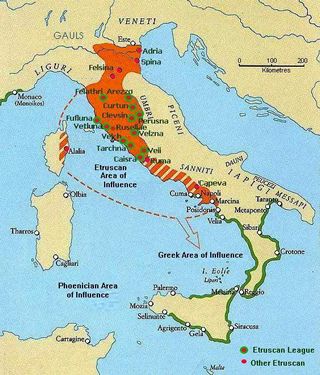|
Introduction: Origins Unknown
 Before the glory days of ancient Rome, northwestern
Italy housed the nation of Etruria, whose people, named by the Romans,
rapidly prospered and declined between 1000 and 100 BC. The origin
of Etruscans civilization is unclear because a large proportion
of Etruscan art and literature did not survive to the present day
and no historical records discovered. Various theories of the Etruscans'
origins include the possibilities that they migrated from Greece,
traveled down from the Alps, or came by sea from Lydia as suggested
by the Greek historian Herodotus. The Etruscan pre-Indo-European
language and other theories from classical historians suggest that
they were indigenous to the area known today as Tuscany and merged
with groups from the eastern Mediterranean, who brought with them
a technically and culturally advanced society contributing to the
rapid rise of a new civilization. Most modern scholarly information
about the Etruscans is derived from studying the remains of their
vast tombs, buildings, monuments, and objects excavated such as
bronze and terra cotta sculptures and polychrome ceramics. Very
little Etruscan literature remains and the inscriptions on their
monuments have been partially deciphered, leaving the truth of Etruscan
civilization a mystery and a favorite culture to explore. (ArtLex;
Adams, 193)
Before the glory days of ancient Rome, northwestern
Italy housed the nation of Etruria, whose people, named by the Romans,
rapidly prospered and declined between 1000 and 100 BC. The origin
of Etruscans civilization is unclear because a large proportion
of Etruscan art and literature did not survive to the present day
and no historical records discovered. Various theories of the Etruscans'
origins include the possibilities that they migrated from Greece,
traveled down from the Alps, or came by sea from Lydia as suggested
by the Greek historian Herodotus. The Etruscan pre-Indo-European
language and other theories from classical historians suggest that
they were indigenous to the area known today as Tuscany and merged
with groups from the eastern Mediterranean, who brought with them
a technically and culturally advanced society contributing to the
rapid rise of a new civilization. Most modern scholarly information
about the Etruscans is derived from studying the remains of their
vast tombs, buildings, monuments, and objects excavated such as
bronze and terra cotta sculptures and polychrome ceramics. Very
little Etruscan literature remains and the inscriptions on their
monuments have been partially deciphered, leaving the truth of Etruscan
civilization a mystery and a favorite culture to explore. (ArtLex;
Adams, 193)
|







